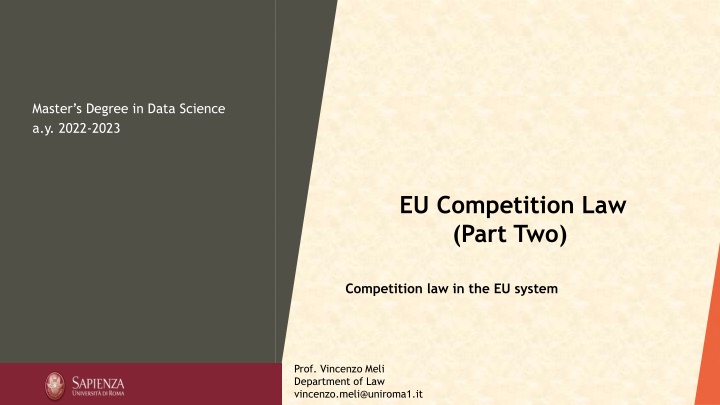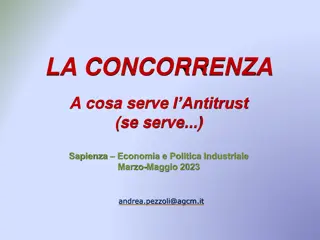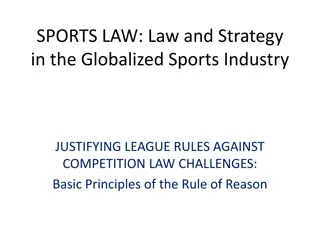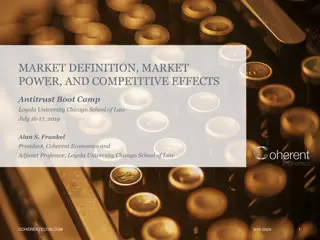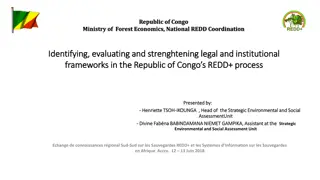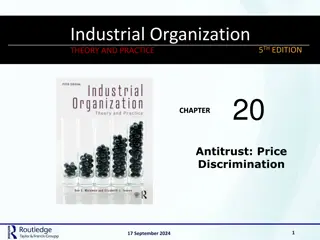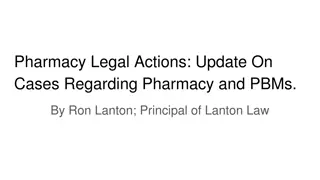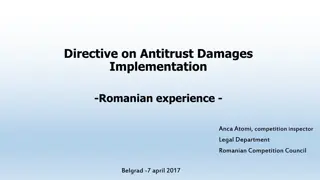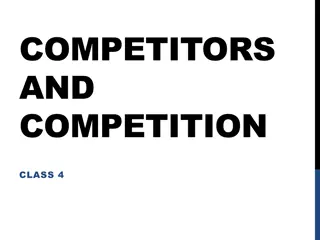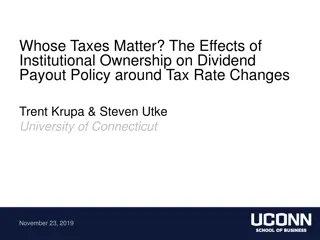Institutional Framework and Antitrust Law in the EU
The European Union's institutional framework is defined by the Treaties of Lisbon, European Union, and Functioning of European Union. These treaties establish the EU's objectives, governance principles, and delineate competences. Additionally, EU antitrust law principles are based on the Treaties of European Union and Functioning of European Union, emphasizing the promotion of a competitive social market economy and open market competition.
Download Presentation

Please find below an Image/Link to download the presentation.
The content on the website is provided AS IS for your information and personal use only. It may not be sold, licensed, or shared on other websites without obtaining consent from the author.If you encounter any issues during the download, it is possible that the publisher has removed the file from their server.
You are allowed to download the files provided on this website for personal or commercial use, subject to the condition that they are used lawfully. All files are the property of their respective owners.
The content on the website is provided AS IS for your information and personal use only. It may not be sold, licensed, or shared on other websites without obtaining consent from the author.
E N D
Presentation Transcript
Masters Degree in Data Science a.y. 2022-2023 EU Competition Law (Part Two) Competition law in the EU system Prof. Vincenzo Meli Department of Law vincenzo.meli@uniroma1.it
The institutional framework of the EU A treaty is a binding agreement between EU member countries. It sets out: EU objectives, rules for EU institutions, how decisions are taken and the relationship between the EU antitrust authorities and courts and the antitrust authorities and the courts of its member countries. - - - - currently Treaty of Lisbon Signed: 13 December 2007 Entered into force: 1 December 2009 Purpose: to make the EU more democratic, more efficient and better able to address global problems, such as climate change, with one voice. Main changes: more power for the European Parliament, change of voting procedures in the Council, citizens' initiative, a permanent president of the European Council, a new High Representative for Foreign Affairs, a new EU diplomatic service. The Lisbon treaty clarifies which powers: - belong to the EU - belong to EU member countries - are shared. The goals and values of the EU and are laid out in the Lisbon Treaty and the EU Charter of fundamental rights.
Treaty on European Union (TEU) It forms the basis of EU, by setting out: general principles of the EU's purpose, - the governance of its central institutions (such as the Commission, Parliament, and Council), as well as - the rules on external, foreign and security policy. - Treaty on the functioning of European Union (TFEU) It organises the functioning of the Union and determines the areas of, delimitation of, and arrangements for exercising its competences.
Antitrust Law in the EU The principles are set out by the TEU, their enforcement by the TFEU TEU: Article 3 ( ) 3. The Union shall establish an internal market. It shall work for the sustainable development of Europe based on balanced economic growth and price stability, a highly competitive social market economy, aiming at full employment and social progress, and a high level of protection and improvement of the quality of the environment. It shall promote scientific and technological advance. TFEU: - Provisions dedicated to competition (Articles 101-107). - Article 120 Member States shall conduct their economic policies with a view to contributing to the achievement of the objectives of the Union, as defined in Article 3 of the Treaty on European Union, and in the context of the broad guidelines referred to in Article 121(2). The Member States and the Union shall act in accordance with the principle of an open market economy with free competition, favouring an efficient allocation of resources, and in compliance with the principles set out in Article 119. Protocols of the TFEU: Protocol No 27: CONSIDERING that the internal market as set out in Article 3 of the Treaty on European Union includes a system ensuring that competition is not distorted.
The enforcement of EU Law (including antitrust provisions) The EU Commission; Essential functions: (a) power of legislative initiative (b) executive function (c) budget implementation and program management (d) monitoring the application of community law (DG Comp)
The EU Commission is at the core of the enforcement of EU Competition rules. It is responsible for: - fact finding; - taking actions against infringements; - imposing penalties; - adopting block exemptions; - conducting sectoral inquiries.
General Court of the European Union (until 2009, Court of First Istance); All actions against the Commission in competition cases are brought in the first instance before the Court Court of Justice; (a) checks the compatibility of acts of European institutions and governments with the Treaties (action for failure to fulfil obligations, action for failure to act, and action for annulment); (b) Hears appeals from the GC on points of law only (doesn t get drawn into factual disputes); (c) rules, at the request of a national court, on the interpretation or validity of provisions of EU law (reference for a preliminary ruling);
Article 267 TFEU The Court of Justice of the European Union shall have jurisdiction to give preliminary rulings concerning: (a) the interpretation of the Treaties; (b) the validity and interpretation of acts of the institutions, bodies, offices or agencies of the Union; Where such a question is raised before any court or tribunal of a Member State, that court or tribunal may, if it considers that a decision on the question is necessary to enable it to give judgment, request the Court to give a ruling thereon. Where any such question is raised in a case pending before a court or tribunal of a Member State against whose decisions there is no judicial remedy under national law, that court or tribunal shall bring the matter before the Court. If such a question is raised in a case pending before a court or tribunal of a Member State with regard to a person in custody, the Court of Justice of the European Union shall act with the minimum of delay.
Relationship between domestic competiton law and EU competiton law The scope of EU provisions on restrictive agreements and abuse of dominant position (i.e., Articles 101 and 102 TFEU) is defined by the notion of "affecting trade between member states Three questions: (a) What does affect trade between member states mean? (b) Can national law be applied when EU law must apply? (c) Can national antitrust authorities and national courts apply EU law?
a) What does affect trade between member states mean? (Commission Notice Guidelines on the effect on trade concept contained in Articles 81 and 82 of the Treaty) The function of the notion "may affect" is to define the nature of the required impact on trade between Member States. According to the standard test developed by the Court of Justice, the notion "may affect" implies that it must be possible to foresee with a sufficient degree of probability on the basis of a set of objective factors of law or fact that the agreement or practice may have an influence, direct or indirect, actual or potential, on the pattern of trade between Member States. As mentioned in paragraph 20 above the Court of Justice has in addition developed a test based on whether or not the agreement or practice affects the competitive structure. In cases where the agreement or practice is liable to affect the competitive structure inside the Community, Community law jurisdiction is established. The effect on trade must be appreciable : Appreciability can be appraised in particular by reference to the position and the importance of the relevant undertakings on the market for the products
(b) Can national rules be applied when EU law must apply? Two possible solutions: One-barrier-theory (when EU law must apply, domestic rules cannot be applied, also if they are stricter); - Double-barrier-theory (when EU law must apply, also domestic rules can be applied) - Previous case law ECJ Case 14/68 Walt Wilhelm v Bundeskartellamt [1969]. The parallel applicability of national competition law of the Member States is only permissible to the extent that the uniform application and the practical efficiency of the EU competition rules are not prejudiced. A conflict between both legal systems has to be resolved following the principle of primacy of Union law. Hence, the prohibition of a measure under the EU competition rules takes precedence over a permission of the same measure through a Member State s law. Current law: Regulation 1/2003: both laws may be applied but: - national rules must not hinder the application of European law; - national rules can flank European law. - what is prohibited by European law cannot be deemed permissible or exempted; - freedom in the case of irrelevance to European law; - non-sanctionability of agreements exempted by European regulation; abuses of d.p. may be sanctioned more strictly
This applies only to the application of Articles 101 and 102 in connection with the application of similar domestic rules on restrictive agreements and abuses of dominant position. It does not apply to delimiting the fields of application of merger law (Reg. 139/04). Such delimitation is done according to rules concerning the turnovers of the companies involved, and the one-stop shop principle applies
c) Can national antitrust authorities and national courts apply EU law? According to Article 9 of the now repealed Regulation No 17/62 (First Regulation implementing Articles 85 and 86 of the Treaty) 1. Subject to review of its decision by the Court of Justice, the Commission shall have sole power to declare Article 85 (1) inapplicable pursuant to Article 85 (3) of the Treaty. 2. ( ) 3. As long as the Commission has not initiated any procedure under Articles 2, 3 or 6, the authorities of the Member States shall remain competent to apply Article 85 (1) and Article 86 in accordance with Article 88 of the Treaty ; they shall remain competent in this respect notwithstanding that the time limits specified in Article 5 (1) and in Article 7 (2) relating to notification have not expired . - This resulted in two rules: (a) immediate effectiveness of Articles 85 and 86 of the Treaty (now 101 and 102 TFEU) even in member states; (b) reservation of exemptions to the Commission (Art. 101(3)); With Reg. 1/2003 (of "modernization"), national authorities and courts can fully apply Art. 101 (including para. 3) and 102 TFEU. Cooperation between the Commission and the competition authorities of the member states. ECN (European Competition Network) ECN+ Directive: Directive (EU) 2019/1
In order to avoid duplication and to ensure uniform and consistent application of European competition law (...) the competition authorities of the Member States are automatically deprived of their competence if the Commission initiates proceedings. Moreover, the latter undertakes to consult the national authority concerned before proceeding. Where a competition authority of a Member State or the Commission has received a complaint against an agreement, a decision of an association or a concerted practice that has been or is being dealt with by another competition authority, the proceedings may be suspended or the complaint dismissed The Commission, before deciding or imposing fines or periodic penalty payments, shall consult the Advisory Committee on Restrictive Practices and Dominant Positions in a meeting or by written procedure.
The courts of the Member States may request the Commission to transmit to them information in its possession or its opinions on matters relating to the application of the European competition rules On the other hand, the Member States undertake to forward to the Commission copies of written judgments of the national courts competent to rule on the application of Article 81 or Article 82 of the Treaty. The Regulation also contemplates the possibility for the Commission and the competition authorities of the Member States to make written or oral submissions before national courts (i.e., to act as amicus curiae)
DIRECTIVE (EU) 2019/1 OF THE EUROPEAN PARLIAMENT AND COUNCIL of December 11, 2018 (so- called ECN+ Directive). Gives Member States' competition authorities powers for the more effective enforcement of competition law; aims to remove those factors, related essentially to different national regulations on competition authorities In particular, it aims at ensuring that: competition authorities are assured guarantees of independence, and that they are provided with the resources and investigative and sanctioning powers that are necessary to effectively enforce the Union's competition rules competition authorities can apply leniency programs competition authorities can cooperate more effectively within the ECN, increasing the scope for extraterritorial investigations
